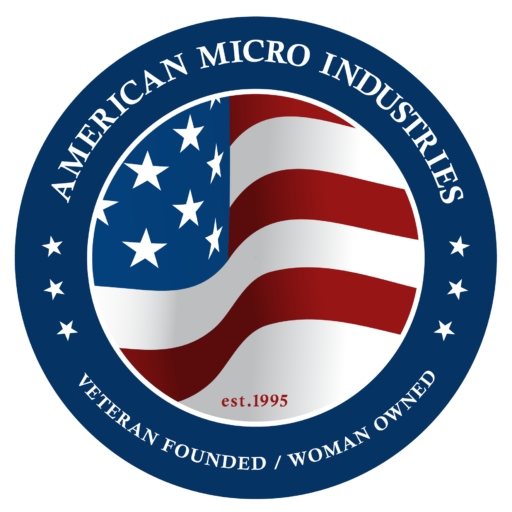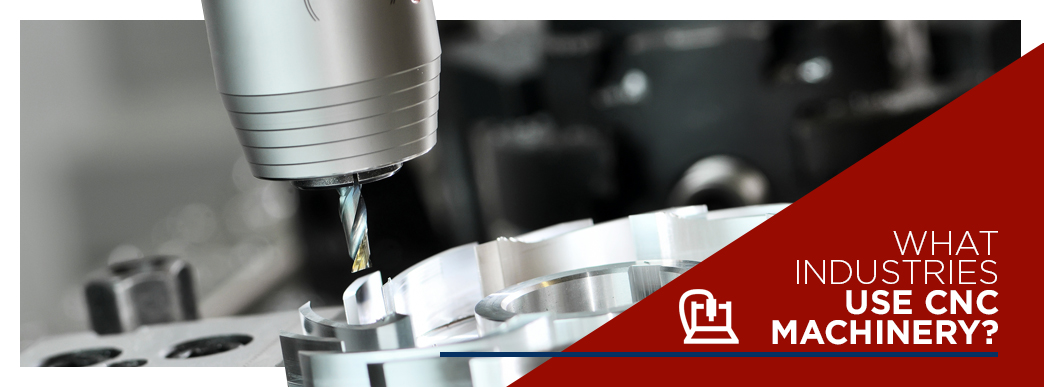
Jump to:
- How CNC Machining Works
- CNC Machinery Capabilities
- Industries Using CNC Machinery
- CNC Material Selection
- Custom Components for Any Industry
Computer numerical control (CNC) machining creates intricate parts and products for various industries. CNC machining can produce large quantities for mass production or create custom parts with precise designs and dimensions. Many companies seek CNC machining for their operations so they can follow through on accurate designs, develop consistent results and ensure parts match. Several industries, from the medical field to transportation, rely on advanced CNC machines and technology for more intricate, customized parts and products than alternative production methods can achieve.
Learn About Our CNC Machining Services
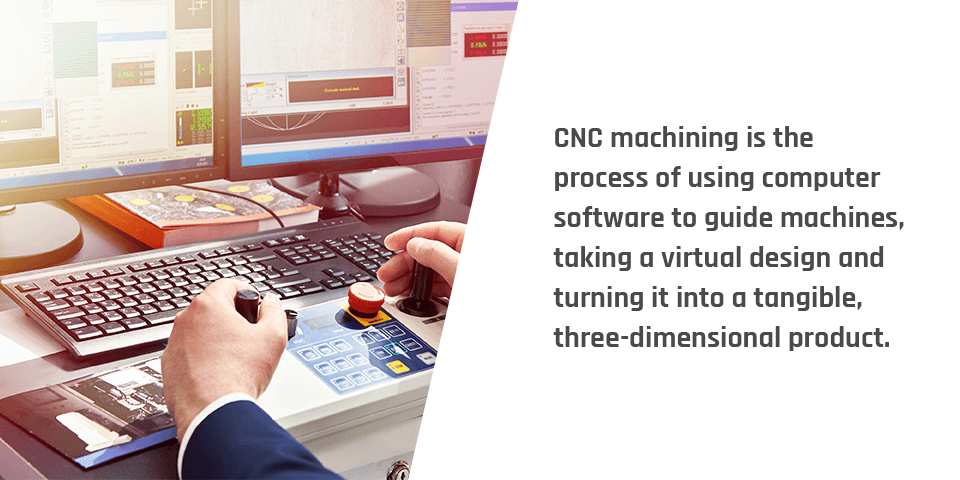
How CNC Machining Works
CNC machining is the process of using computer software to guide machines, taking a virtual design and turning it into a tangible, three-dimensional product. This process is a form of subtractive manufacturing, meaning projects begin with a block of material that machines cut away to create the intended design. Computer programming aids the entire process, helping experts make products with extreme design accuracy.
CAD Software
A CNC project begins with creating a design using computer-aided design (CAD) software. Designers can create virtually any object with 3D software, but they must keep in mind any material specifications or CNC machine limitations, or they’ll risk creating a piece that doesn’t match its design. For example, machines cannot replicate curved cuts, and stiff materials may not produce the expected appearance.
CAM Software
A programmer uses CAM Software to digitally manipulate the design into a format the CNC machine’s computer can understand. Machinists make sure the CNC machine has the right tools for the job and place the selected material in the machine. Finally, the CNC program tells the machine to create the product based on the design.
Machinists
While CNC machines use computers to accomplish much of the manufacturing on their own, machinists will often still play a role in the process. Particularly complex designs or different types of machines may require machinists to stop the operation and rotate some parts from time to time. Machining may also only be the first step before finishing touches that must be done by hand.
Devices, Tools and Methods
CNC machining uses several types of devices. Milling, screw machining and machine turning operate in various methods, turning either the tools or the materials. Workers choose machining methods based on the product’s required precision and the content used. Their options are:
- Machine turning: Similar to a lathe, CNC milling machines turn the material under computer control. The machine turning method makes mass production of customized parts possible.
- Screw machining: Screw machining requires an expert setup. Despite the extra time needed, screw machining produces precise parts that can be as small as 0.005 inches.
- Machine milling: Machine milling turns the tools around the piece, with the mills using numerous tools for highly detailed parts.
Learn About Our CNC Machining Services
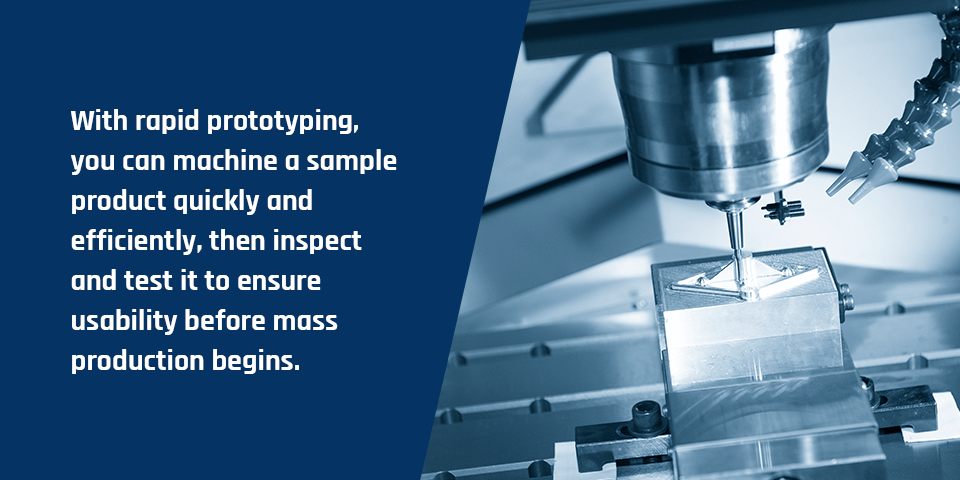
CNC Machinery Capabilities and Benefits
CNC machining is crucial in a wide range of applications due to the following capabilities and benefits:
Speed and Efficiency
The entire CNC machining process can be completed quickly, as machinists can create CAD drawings in a matter of a few days. If needed, CAD designs are easy to alter, so making, testing and adjusting 3D models or prototypes is relatively fast and simple. Additionally, cutting away from blocks of existing materials is a speedy process. In addition, CNC machines can be part of an assembly line so multiple machines can work together, efficiently producing many products or all the parts for one product simultaneously.
Automation, Precision and Consistency
CNC machine use primarily relies on automated processes, resulting in accuracy and precision. Machinists can use CNC machines to produce many product designs, from standard shapes to objects with tapers and compound contours. The CNC machining industry can handle your largest or smallest jobs, from manufacturing big parts to sculpting precise pieces and completing them with secondary finishing operations. The automated process allows for quality consistency, ensuring all products are the same, even at mass-production levels.
Versatility
CNC machining also allows for versatile manufacturing, as you can use various materials to make parts with the exact specifications you need. Many projects can benefit from this level of precision, including creating custom components or rare replacement parts.
Though many people associate machining with metal, machinists successfully create parts out of other materials, such as phenolics, plastics, rigid foam and carving foam. These alternative materials increase the versatility of machining to include options that are water-resistant, long-lasting, non-conductive or have other features not found in metals.
Ability to Create Prototypes
CNC machining is also uniquely equipped to create product prototypes. With rapid prototyping, you can machine a sample product quickly and efficiently, then inspect and test it to ensure usability before mass production begins. Rapidly machining parts with precise software allows you time in the production process to implement accurate designs during testing and manufacturing and can decrease the amount of waste your company makes.
Learn About Our CNC Machining Services
Industries Using CNC Machinery
Various industries depend on CNC-machined parts for different applications, which is why precision and accuracy are essential. Precision is especially crucial in industries such as aerospace, defense, petrochemical and medical, where human safety is a concern. Maintaining accurate production is paramount for these industries because precise parts help prevent accidents, injuries and serious complications. CNC machining can achieve the levels of precision necessary to save lives when it counts.
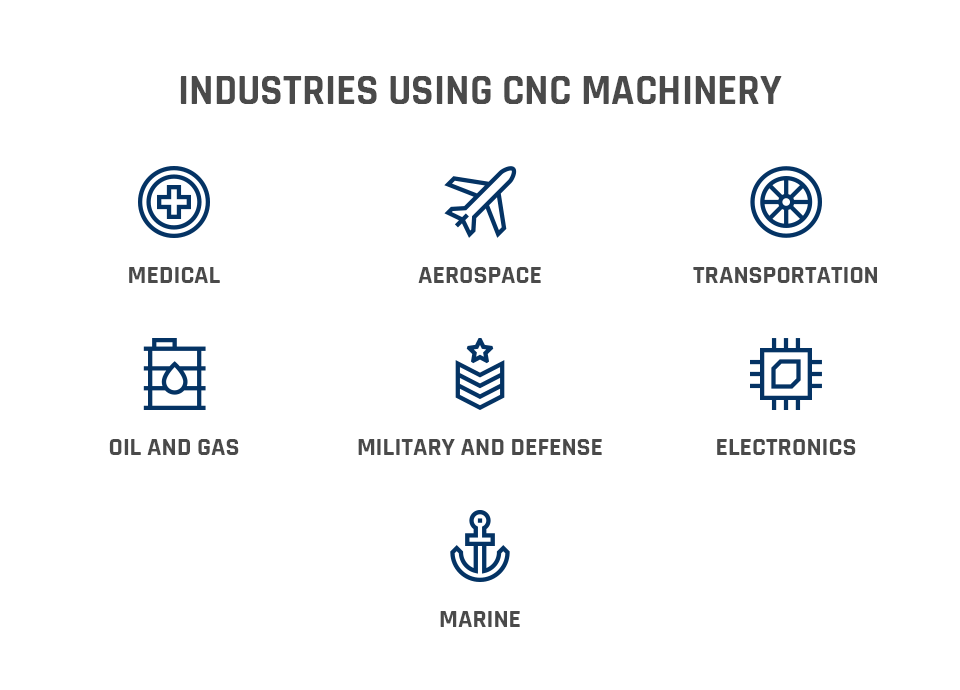
Some manufacturers have their own equipment to make parts and products, using special techniques, tools and materials based on their industry’s unique needs. Other companies decide to work with professional CNC machining businesses to make their parts. Working with an experienced CNC machining company is essential because a dependable company uses advanced technology and processes to meet specific industry needs. Professional CNC machinists use the right machine, tools and materials for each job to ensure accuracy based on application.

Learn more about common CNC machining industries:
Learn About Our CNC Machining Services
1. Medical Industry

The medical field relies on customized, quality products to maintain a high level of patient safety and care. Various types of CNC machines adapt well to the medical industry’s needs. Due to the many materials and devices available, some examples of CNC machine uses for the medical industry include:
- Implants
- MRI machines
- Orthotic devices
- Electrical parts
- Electronic enclosures for monitoring devices
- Research equipment
- Shielded enclosures
- Customized sterile packaging
- Pieces made of high-temperature plastics
- Medical instruments
- FDA-approved products
The medical industry also uses many disposable devices to protect patients from catching infections or diseases while receiving medical care. Medical businesses require high volumes of precise parts to deliver patient care and keep their facilities stocked with essentials. Occasionally, companies may request prototypes before beginning full production, especially when testing new ideas. Prototypes are critical in the medical field, as professionals need to ensure the products work well before using them with patients.
Benefits of CNC machines in the medical field include the ability to create customized parts rapidly. Those in this industry, however, also require the manufacturing of these parts in FDA-approved environments. When crafting individual designs, the CNC software allows engineers to see all aspects of the piece in three dimensions before machining it. This process ensures every component has the exact dimensions it needs to operate correctly. Parts that will fit together must have the smallest possible margin of error, as issues can lead to machine malfunctions and medical misdiagnoses.
2. Aerospace Industry
Devices in the aerospace industry encounter varied conditions, including high speeds, fast air currents and extreme air pressures. To avoid aircraft damage, engineers must construct each component with the most precise parameters, tools and parts. Even a small mistake could catch on an air current, producing drag or increasing wear on the parts.
Aerospace CNC machining must meet incredibly precise requirements, and some have tolerances as tight as 0.00004 inches. Machinists must adhere to such tolerances with extra-durable industry-standard materials such as titanium, aluminum, nickel and some plastics. The exact materials depend on the parts being created and the required properties for that CNC component.
The aerospace and aviation industry uses various parts for aircraft and aircraft service devices, including:
- Manifolds
- Airfoils
- Bushings
- Electrical connectors
- Landing gear parts
- Antennae
- Radiofrequency suppression materials
CNC machining provides the customized parts with extremely tight tolerances that aerospace companies require, enabling the industry to reach its current technological level. Having an easy means of creating experimental pieces is critical to future safety and success.
CNC machining is also an ideal method for manufacturing aerospace part prototypes. Viewing the 3D image on a computer allows the engineer to test the part’s functionality and make quick changes if necessary. Once finalized, engineers can begin the CNC machining process for rapid part production. The transition from individual to mass production of parts for the aviation or aerospace industry becomes simple with the use of CNC machines throughout the process
3. Automotive and Transportation Industries
Many aviation industry components, such as engines, are also important in the transportation and automotive industries. Product research and testing are just as vital to these industries as they are to the air and space industry because they affect safety and the ability to travel.
Vehicle designers and manufacturers must test physical part prototypes so they know how to adjust their original models and new designs for better results. CNC machining allows engineers to create prototypes, test their practicality and eventually make a design with the exact specifications they need.
While the air and space industry requires crafts built for speeds faster than sound, the transportation and automotive sectors require longevity. Transportation vehicles need robust components strong enough to haul heavy cargo far distances, and manufacturers rely on CNC-machined parts to produce dependable cars and trucks. The transportation and automotive industries may need CNC machines to construct parts used in various vehicles, such as:
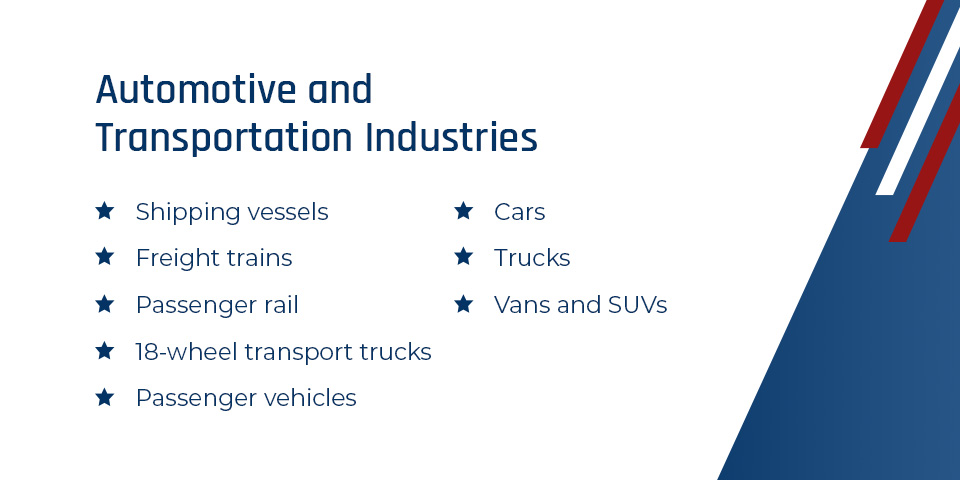
- Shipping vessels
- Freight trains
- Passenger rail
- 18-wheel transport trucks
- Passenger vehicles
- Cars
- Trucks
- Vans and SUVs
Due to their rapid movement, high-speed trains undergo extra strain, so precision is especially important when manufacturing parts for train cars and engines.
Because CNC machines can create parts from several types of materials, they can make everything from the brakes to the engine parts and even tools. Just as passenger automobiles are evolving to become more efficient, cargo vehicles in the transportation industry face similar changes. CNC machining makes it easier for engineers to hasten research and development processes to manufacture enhanced vehicles and parts faster.
Learn About Our CNC Machining Services
4. Oil and Gas Industry
The petrochemical industry uses large machines for refineries and drilling rigs. This line of work relies on well-machined, precise-fitting parts. Precise fits prevent issues such as valve leaks, piston failures and cylinder malfunctions. Petrochemical companies also rely on precise components to maintain efficient operations.
Drilling rigs require parts with a high tolerance because they operate in isolated areas. Replacement parts or repairs can result in days of equipment downtime, so parts manufactured for rigs must maintain long-term quality and durability. Equipment on drilling rigs may be exposed to sea salt spray, desert dust or snow from the northern plains, so it’s crucial to ensure parts can withstand these elements.
CNC machining can produce components such as the following for refineries, pipelines and rigs in the oil and gas industry:
- Pins
- Rods
- Valves
- Pistons
- Cylinders
- Drill bits
The oil and gas industry moves at a speed that requires rapid turnarounds and occasional high-volume part processing. CNC machine industry benefits for this sector include the ability to create specialty products for jobsites. Additionally, CNC operations can produce large or small pieces for the industry, as well as the components needed for electronic gears that are becoming increasingly popular in the oil and gas sector.
5. Military and Defense Industry

Similar to the oil and gas industry, the defense sector requires durable parts that withstand even the harshest environments. The government sets strict regulations for military activity. Just as medical supplies must have their production fulfill rules created by the FDA, military products need to adhere to government regulations.
The military as a whole encompasses a multitude of sectors. Products and parts created for defense may seem similar to those from other industries, such as the aviation, electronics, marine, transportation and medical industries. However, these other industries don’t have as much need to keep up with the latest technology while having access to reliable parts in the most remote locations. The defense sector requires precise parts such as:
- Communications components
- Transportation components
- Electronics
- Plane parts
High-security measures require secrecy surrounding the exact procedures and products used in creating military equipment. However, this sector can gain benefits from using CNC machining, such as efficient upgrades, long-lasting parts made of tough materials and the mass manufacturing of approved parts that require precise tolerances. The military is among the industries with CNC machinery that may require regular device upgrades. Precise machining and prototype capabilities allow the defense sector to use the latest technology and supply the best homeland protection.
6. Electronics Industry

CNC machining is an effective solution for manufacturing small components such as those used in electronics applications. Technological advancements depend on small, lightweight devices and components with laser-precise parameters under 10 micrometers, and CNC machining can meet these requirements. CNC machining can also produce components to protect communication devices from interference and connect the following types of components:
- Heat sinks
- Electrical insulation
- Amplifier housings
- Radiofrequency interference shielding
Smaller parts require tighter tolerances. Electronics and other electrical components require error-free micro-machining, and humans are incapable of achieving such accuracy levels on their own. Using a computer to cut and control the machining tools increases precision levels when creating minuscule components. The electronics industry owes its success to the superior accuracy produced by CNC machining.
7. Marine Industry
The marine industry also owes its success to the various CNC-machined components it uses. Many watercraft elements require unusual materials or shapes, and machining is the perfect method for meeting those needs with minimal effort.
Unlike other sectors, the marine industry requires a high degree of water resistance from its products because most components will have either direct water exposure or exposure to the humidity around oceans, lakes and rivers, which can wear out parts. Most electronics don’t operate well in moist or wet environments. Marine products, however, require water-resistant electrical components. A ship’s electronics need specific features, such as housings, to prevent water from hindering electrical processes. Additionally, parts that come into contact with salt water must be corrosion-resistant to prevent damage.
Marine applications also require a high degree of portability and durability. Components must last for a long time and resist compromising wear and damages, as vessels out at sea might have to wait a long time before coming back to land for repairs. CNC machining can help produce long-lasting parts by making them to exact design specifications, so they fit tightly and work well together without fail. Some of these components include:
- Insulating cases
- Electronic parts
- Engine components
- Propellers
- Prototype molds
- Other boat parts
CNC benefits the marine industry through its ability to make custom parts. Whether for small boats or industrial shipping vessels, boat parts may need custom specifications to fit the user’s needs. With CNC machining’s versatility, engineers can make both large and small pieces, depending on the available machinery. Marine foams have a range of types, including rigid polyurethane and thermoplastic polyurethane, that engineers can use to create water-resistant, lightweight and durable parts for boats.
Learn About Our CNC Machining Services
CNC Material Selection
CNC machining benefits several industries, and each application requires specific materials for the best results. Narrowing down all the options helps machinists arrive at the most useful and long-lasting solutions for their products. Some popular materials used in the above industries to make products and prototypes include:
Plastics
Plastics represent a wide range of materials, versatile in many industries. The medical field uses plastic for custom packaging to ensure product safety. Many healthcare supplies must also withstand high working temperatures, which certain plastics can accommodate.
The defense industry also uses plastics to make lightweight, temperature-stable parts for antennas, microwave lenses and more. Epoxy resins are strong enough for homeland security applications and can often meet specific temperature requirements.
Polyester film, another polymer resin, is a flexible and stable insulating material for electrical products and also has medical uses. Some plastics are friction and corrosion-resistant, ideal for products like bushings and bearings that may experience harsh environments. Other plastics are transparent, perfect for products that need to be stronger than glass but still see-through, like bullet-proof glass.
Carving Foam
Foam is lightweight and soft but also dense enough to withstand various applications. Moisture and rust-resistant, rigid foam will maintain its structural integrity even when exposed to water and rough conditions, making it useful in the marine industry. Its flexibility allows it to take almost any shape through CNC machining, and it’s a great material for creating intricate, detailed shapes.
Carving foam is ideal for fabricating seals, gaskets and electrical components. The defense industry also uses flexible, water-resistant foams for weatherproof radiofrequency products, as well as heat-resistant foams for custom homeland security projects.
Phenolics
Phenolics are fabric-reinforced laminates that have high tensile and flexural strength and work well for electrical applications. Thermosetting glass-reinforced laminates, like G10/FR4, are flame-retardant, heat-stable materials often used for electrical insulation, protecting people from strong electrical currents. G10/FR4 can also be used in printed circuit boards for telecommunications devices, as well as electrical controls like timers and transformers.
Other phenolic laminates have properties such as stability at higher temperatures, hardness and dimensional stability under different conditions. GPO3, in particular, is an electrical-grade material that achieves arc-resistant insulation in high-voltage parts such as switchgears, transformer components and TV parts. Some phenolics are even friction, abrasion and chemical-resistant, for use in various specialized industries.
Learn About Our CNC Machining Services
Custom Components for Any Industry
CNC machining is your solution for industry-specific parts made to your project’s exact needs. Worldwide innovation begins with a creative design, which is perfectly suited to the CAD and CNC machining process.
When searching for a machining company to execute your custom ideas, partner with machinists who will bring your unique designs to life. American Micro Industries is proud to offer customized CNC machining services. Whether you’re interested in materials for your design or in collaborating with us from the beginning of your project, we’re your single source for all the processes involved in manufacturing the parts you need.
Learn More About CNC Machining for Your Industry
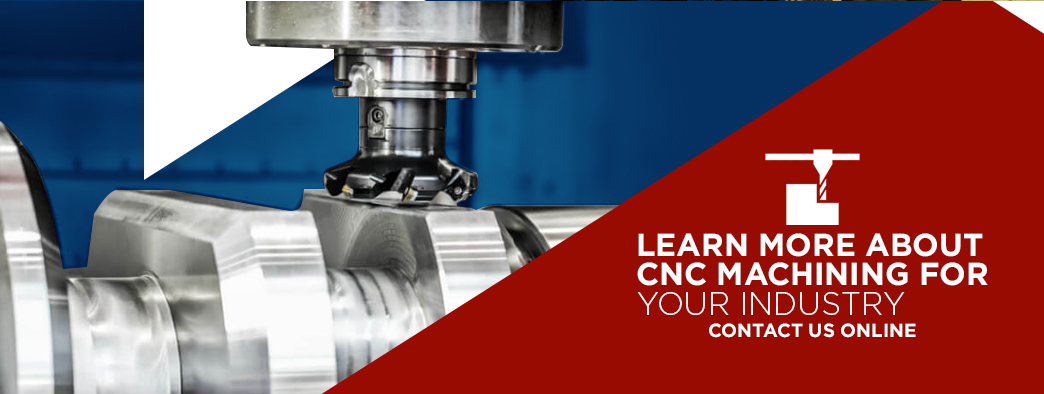
Various industries depend on CNC machining because it enables companies to create parts from multiple materials, increase precision and maintain consistency. From drill bits to medical devices, CNC machining can produce customizable components that meet the precise needs of specialized sectors.
American Micro Industries provides expert CNC machining services for a wide range of industries, producing large and small components with accuracy and precision. From customizable prototypes to bulk orders, we have the skills and experience to meet your exact needs and parameters. Contact us to request a quote and learn more about our services.

